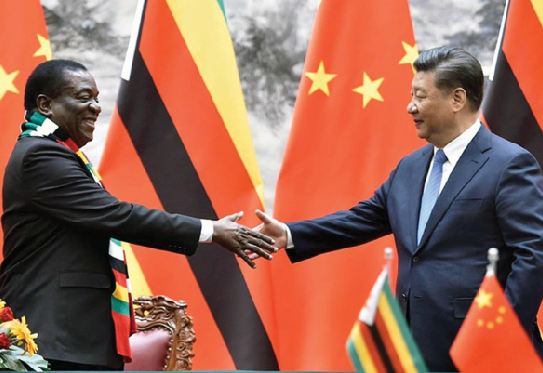China defends its companies
CHINESE authorities have aggressively waded into the standoff between Beijing’s companies operating in Zimbabwe and the “superfluous” non-governmental organisations, boasting that without the world power’s investments, Harare would be “candle lit” and struggling without internet.
China has emerged as the biggest source of investment into Zimbabwe since Harare’s diplomatic tiff with Western powers two decades ago, which led to a damaging embargo, whose cost to the economy has been estimated at about US$100 billion.
Despite injections of at least US$2,5 billion, Chinese multinationals have had a frustrating time in Zimbabwe, where they face accusations spanning from labour and human rights violations to environmental degradation, tax evasion and foreign currency externalisation.
Confrontations hit tipping point on Friday after another rebuttal by 27 NGOs, who claimed, in a statement, that Chinese firms were displacing hundreds of villagers from chrome fields, gold claims and coal mines in their hunt for Zimbabwe’s mineral resources.
Other reports have slammed Chinese investors for digging up graves and decimating ecologically sensitive forests in an accelerated exploration of minerals in Zimbabwe.
The Chinese embassy said the “dubious” NGOs’ combative claim “stinks of a hideous agenda from groups that make a living from political advocacy”.
It said they had ignored China’s huge investments, which propped up Harare’s faltering economy.
“Were it not for China’s funding support and the work of Chinese companies in ICT and power generation, even the statement in question would perhaps have to be scribbled on a piece of paper, in a candle-lit room, and never find its way on a functioning internet,” Chinese diplomats in a statement.
“How can a few unsubstantiated stories be used to negate China’s real, enormous contribution to the development of Zimbabwe…and the improvement of the wellbeing of ordinary citizens?” the embassy said.
The embassy claimed that NGOs’ work pale into insignificance compared to 100 000 Zimbabweans employed by Chinese companies.
“Suffice to say that they are significantly outnumbered by the Zimbabwean employees working in companies established with Chinese investment and outnumbered by the ordinary Zimbabwean citizens who are benefiting from China-Zimbabwe cooperation…Chinese State-owned and private businesses have been making great contribution to the improvement of local people’s livelihoods.”
“Dragging Chinese investors into political sideshows or making them victims of domestic political vendettas hurts the people of Zimbabwe and the development of the country as a whole. It is a way of extending sanctions by trying to force Chinese investment out of the country to make Zimbabwe more vulnerable. What is most sad about the statement is that it ignores the wolf in the room that is truly threatening the lives of local people. That is the sanctions,” added the embassy.
On Sunday, the Chamber of Chinese Enterprises in Zimbabwe (CCEZ) also attacked the NGOs.
In a statement, the CCEZ, which represents some of the world’s biggest corporations, came close to admitting serious transgressions by its members, but quickly reminded the NGOs that “it is not within our space to correct perceived legal gaps or inadequacies in laws’ in the country.
“We strongly deplore and oppose groundless accusations that are malicious and driven by falsehoods,” the CCEZ hit back. “Our member companies employ more than 100 000 local people throughout different sectors, worth billions in US dollars of investment. We have done this heeding the clarion call that “Zimbabwe in Open for Business” and in line with Zimbabwe’s aspirational targets such as achieving a US$12 billion mining economy by 2023 and Vision 2030 of achieving, and upper middle-income economy by 2030.
“Instead of engaging in microphone diplomacy and manipulation of public opinion, anyone or any civil society can resort to legal means if any of our member companies does anything illegal.
“People, who engage in microphone diplomacy, always have their clandestine political agendas,” said the CCEZ.-newsday










